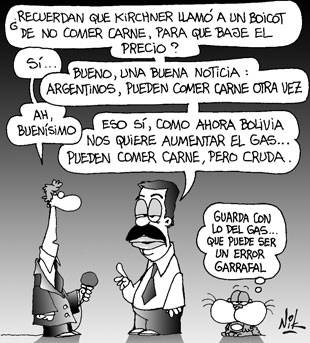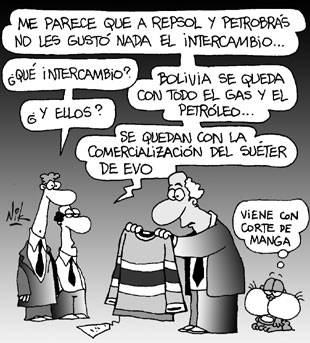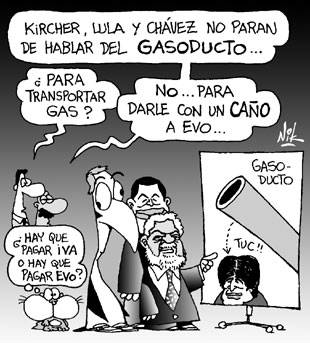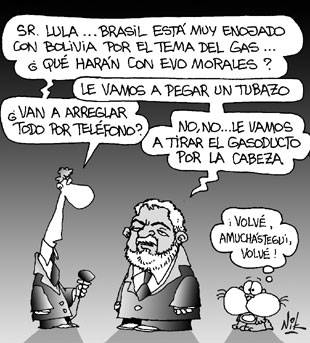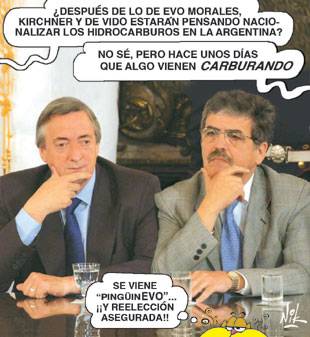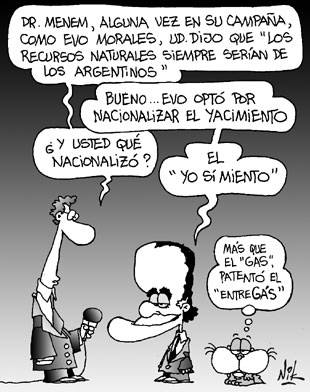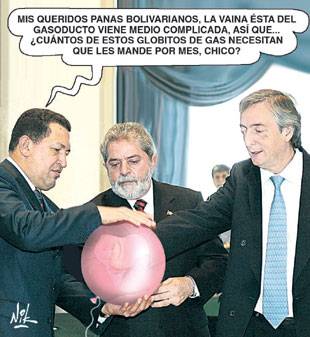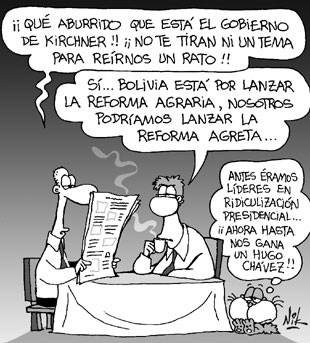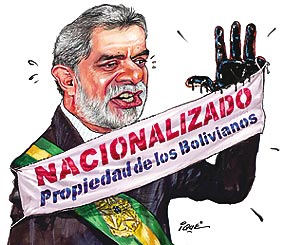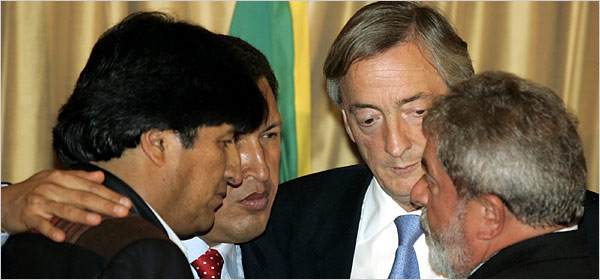
By PAULO PRADA and JUAN FORERO
Published: May 5, 2006
PUERTO IGUAZÚ, Argentina, May 4 — There were smiles and bear hugs all around as four South American leaders met here Thursday to defuse a crisis set off by Bolivia's decision this week to nationalize its energy reserves.
But the joviality could not disguise the strains, as the leaders of Bolivia, Venezuela, Brazil and Argentina walked away with little more than an agreement to negotiate the prices of the natural gas that Bolivia will now control, and to keep talking.
"In this meeting, any concerns the presidents may have had have been dispelled," said Bolivia's new president, Evo Morales, whose announcement on Monday has deeply unsettled Brazil and Argentina, which depend on Bolivia's natural gas to fuel their growing economies.
But even as he and the other leaders insisted there was no rift among them, the urgency of the meeting demonstrated the potential for economics to trump ideology, with Brazil and Argentina increasingly worried about where they are going to get their fuel, and at what price.
The crisis has been particularly damaging to Brazil's president, President Luiz Inácio Lula da Silva, who has been harshly criticized at home as having failed to look after his country's interests.
Critics say Mr. da Silva, who is expected to run for re-election this year, has surrendered political space to Venezuela's president, Hugo Chávez, who joined the meeting at this Argentine resort town as Bolivia's most strident backer.
"The Brazilian press has been very critical about Lula the last three days," said Timothy Powers, an expert on Brazil at Oxford University, "that Lula has been playing footsie with Chávez and Evo, and that when it comes to national interests like gas, Lula is very naïve in getting himself into this position. Lula looks weak, like he's a prisoner of events."
As a gesture, President Néstor Kirchner of Argentina, Mr. da Silva and Mr. Chávez invited Bolivia to take part in a proposed but still distant project to build a $20 billion pipeline, to run 5,000 miles from Venezuela to Argentina.
But the pipeline's future is uncertain and the meeting did little to address more immediate concerns: the price of gas in the countries supplied by Bolivia, which holds the largest gas reserves in Latin America, after Venezuela.
The Brazilian energy giant, Petrobras, was already moving to find alternative sources of gas outside Bolivia, and said it was working to develop untapped fields in Brazil, spending $8.8 billion in the next four years to develop gas beds off the southeast coast. But those plans are expected to take years.
"The market is growing fast and we're working to develop as many sources for gas as we can," Ildo Sauer, the company's director for natural gas and energy, said in a telephone interview.
He also said the company would contest efforts by Bolivia to raise the price of the natural gas that Petrobras imports beyond that stipulated by existing contracts. "The present price is fair," he said. "Anything beyond that, we'll challenge through the appropriate arbitration."
Officials from Petrobras said Wednesday that they would immediately suspend investments in Bolivia. The move was not retaliation, the chief executive, José Sergio Gabrielli, told reporters, but rather a logical business decision.
While the crisis has highlighted the mutual dependency of the region's economies, it was not clear that the lesson was yet fully absorbed, particularly in Bolivia, an impoverished, landlocked country whose natural gas reserves were developed by foreign companies in the late 1990's.
Before the summit meeting here, Mr. Morales, quoted by Bolivia's state information agency regarding Petrobras's investment decision, said, "They can blackmail, but it's not possible that they build a great company with our resources and leave our country's economy in bad shape."
At the moment, Venezuela is offering itself as an eager partner to take up some of the slack in Bolivia left by wary investors.
The Venezuelan state oil company, Petróleos de Venezuela, is helping Bolivia's small state-run energy company to begin developing its new role as a clearinghouse for oil and gas, while investing in new facilities.
The first investment, a $40 million plant to process liquid hydrocarbons, will be formalized in La Paz, Bolivia's capital, on May 18, Rafael Ramírez, Venezuela's energy minister, said in an interview after the meeting.
"We are prepared to make the necessary financial and technical agreements to help Bolivia get under way with the new structure of the industry," he said.
Still, Petrobras's tactic dampened the mood the four presidents wanted to establish. Mr. da Silva dismissed this week's energy troubles as growing pains essential to future prosperity. Mr. Chávez painted the Bolivian nationalization as a step that would lead to more energy integration.
Political analysts were unconvinced. "One of the great problems of populist rhetoric is that they tend to make promises they later cannot deliver," said Riordan Roett, a Latin America expert at Johns Hopkins University.
Paulo Prada reported from Puerto Iguazú for this article, and Juan Forero from Santa Cruz, Bolivia.



